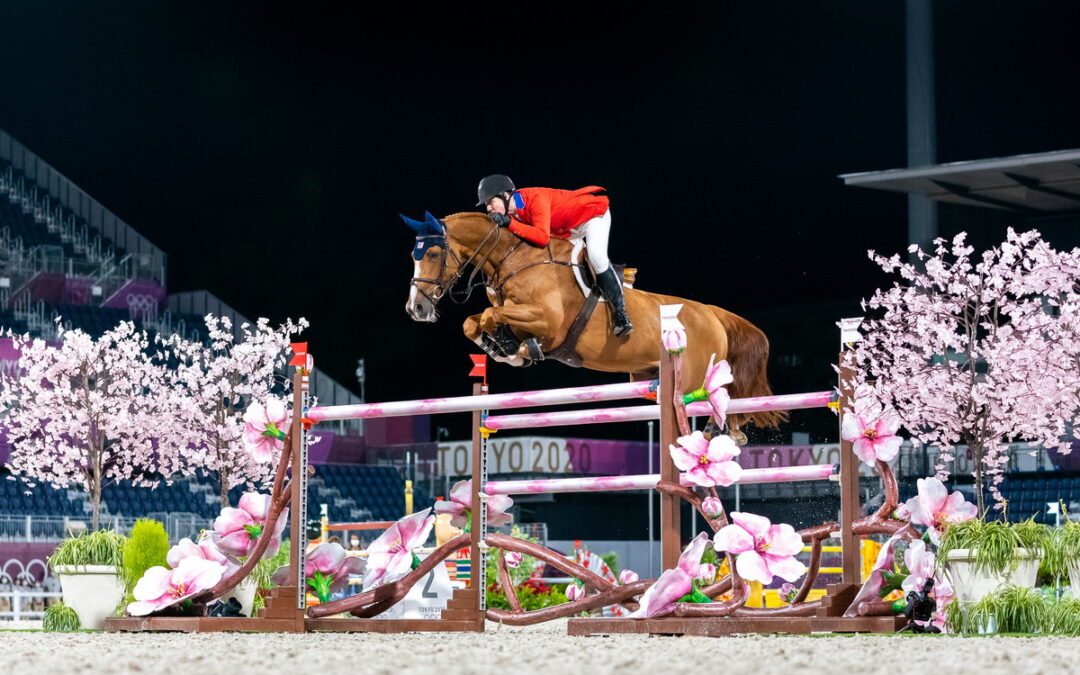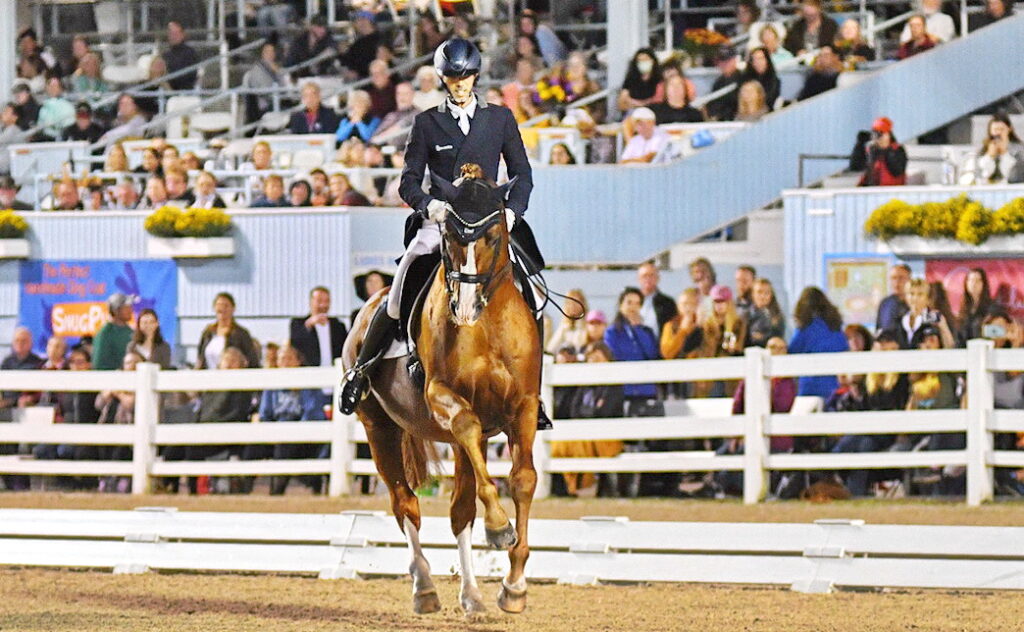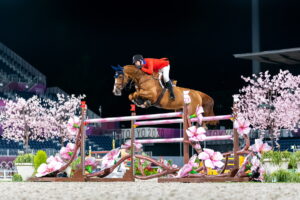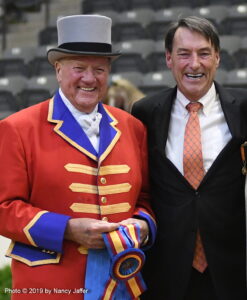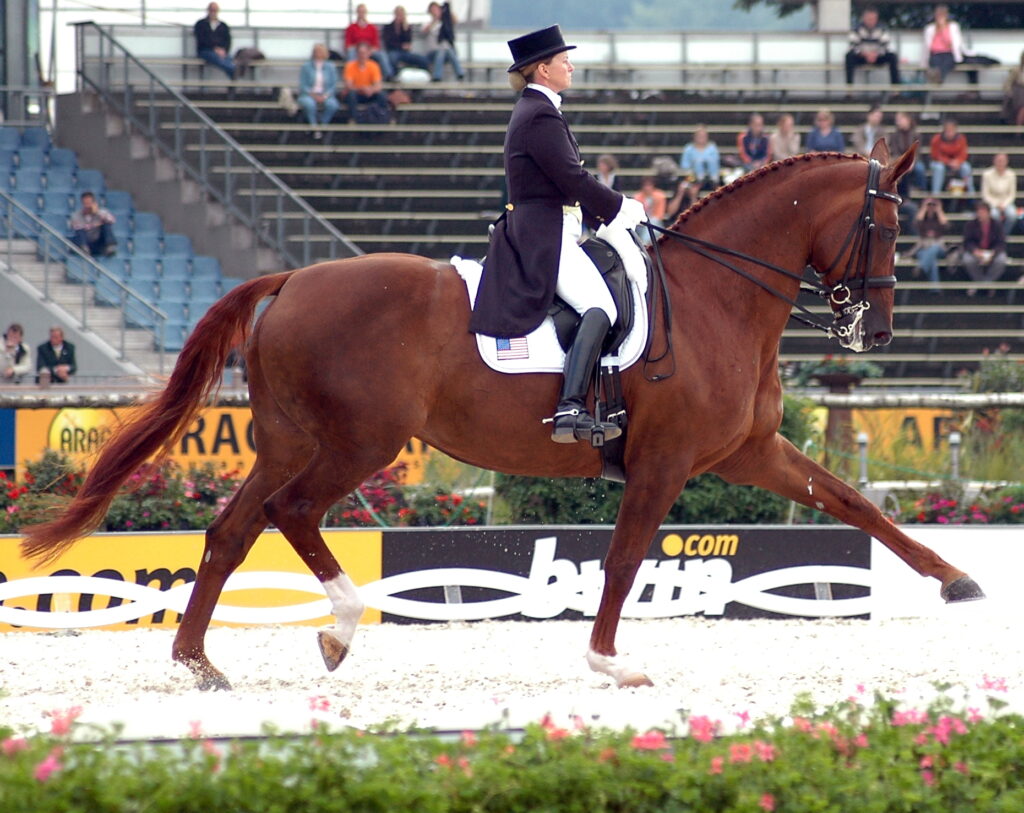My headline, which I have always used for New Year’s stories over the decades, comes from a seldom-sung verse of a favorite carol, Deck the Halls. Last year at this time, the headline signaled the hope that 2021 would be better, so good riddance to 2020. We all agreed 2020 couldn’t pass away fast enough. But few could have guessed what new tribulations 2021 would bring, although the Olympics gave us a bright spot for a few weeks.
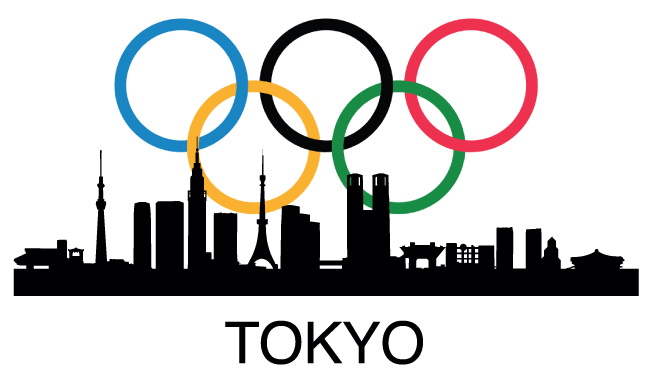
After Covid became a national emergency in March 2020 and the U.S. Equestrian Federation suspended all showing until June 1, I asked federation CEO Bill Moroney when he thought things would get back to normal.
“December,” he said, but he was talking December 2021, not 2020.
“Really?” I replied in disbelief, anticipating it would have been much sooner. Turns out we were both wrong–our guesses were too optimistic. Omicron, a word you likely didn’t know unless you spoke Greek or belonged to a fraternity, is now part of our everyday language. Things are still being cancelled; the U.S. Equestrian Team Foundation, for instance, just called off its Jan. 21 party to raise funds for the 2022 world championships. (The Westminster Kennel Club even postponed its January show.)
Five major winter indoor competitions in Europe already have fallen by the wayside, and there may be more to come. Will the FEI World Cup Finals in dressage, jumping, driving and vaulting be held in Leipzig, Germany this April after a two-year hiatus for the competition? Or will we have to wait for Omaha in 2023 for the first Cup finals since 2019?
So I’m saying, “happy new year?” rather than “Happy New Year!”
The Covid situation has meant some major modifications to the equestrian scene.
The Washington International show was able to hold its 2020 and 2021 editions, but they were in Tryon, N.C., far from DC and the unique character of this fixture. In the meantime, its lease at the Capital One Center expired. So the show isn’t going back to the city whose name it bears, heading instead to the Prince George’s Equestrian Center in Maryland.
That’s a big change on the North American Fall Indoor Circuit, which didn’t see its finale, Toronto’s Royal Winter Fair, in either 2020 or 2021. Devon’s multi-discipline show was cancelled for the second year in a row (though Dressage at Devon did run at the venue in the fall). The anticipated Olympic/Paralympic quarantine restrictions at the USET Foundation in Gladstone, N.J., meant the popular and innovative Monmouth at the Team show became Not Monmouth, Not at the Team, when it moved to Centenary University’s equestrian center in Morris County.
On the other hand, the Winter Equestrian Festival in Wellington, Fla., is flinging open its doors and inviting spectators in for 2022, though fans are advised to have a mask handy. It was big news when a new partnership was formed for ownership of the Palm Beach International Equestrian Center, with famed riders Ludger Beerbaum (show jumping) and Andreas Helgstrand (dressage) involved. Major improvements already have been made to the home of WEF.
The good thing about how Covid tested the world of equestrian competition is the way so many people and organizations rose to the challenge. Equestrian Sport Productions continued without a hitch at WEF and the Adequan Global Dressage Festival (unless you didn’t pass the temperature test).
A group of determined riders, owners and supporters, led by Sara Kozumplik Murphy; her husband, Brian, and other stalwarts wouldn’t take no for an answer when it was announced the Kentucky 5-star wasn’t going to run. They pushed to get it done, and it happened, albeit with cardboard photos of spectators in the stands, rather than real fans.
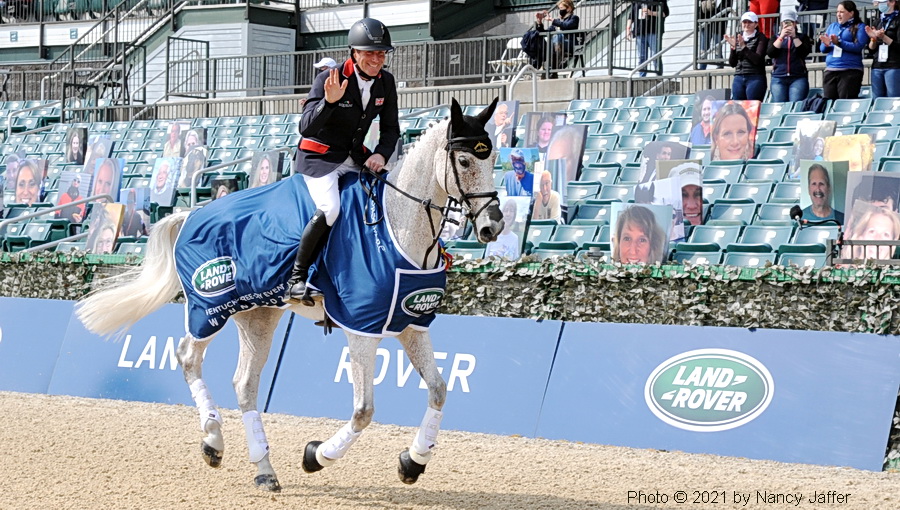
Let’s hope we don’t have to resort to cardboard photo spectators again, as we saw at Land Rover Kentucky during April. (Photo © 2021 by Nancy Jaffer)
The biggest story of the year was the Tokyo Olympics, which the International Olympic Committee insisted on calling the 2020 Olympics, even though they were held in 2021. It was hard to believe the Olympics could be staged in the midst of Tokyo’s Covid restrictions and that equestrian sports there could run as well as they did, but it happened. The ban on spectators meant atmosphere was lacking, but the competition itself was great and I was able to give my readers a window on the action in 20 stories on this website.
I have never gotten as many thank-you notes as I did for my Olympic coverage, because Nancy Jaffer Equestrian Sports became a go-to for those who didn’t want to rise at 4 a.m. or 6 a.m. Eastern time (and even earlier in other parts of the country) to watch the livestream. Cross-country was the only segment shown in its entirety during what was a comfortable evening time frame on this side of the globe. The Olympics, despite all their problems, are still popular with those who love horse sports.
Tokyo highlights for the U.S. included team silver medals for both the dressage and show jumping squads, as well as the country’s first team para dressage medal and two individual para golds for world number one Roxie Trunnell on Dolton.
Zoom was a still a go-to for many meetings this year. The U.S. Dressage Federation and U.S. Hunter Jumper Association cancelled plans for in-person annual meetings, but the U.S. Eventing Association went ahead with its convention; after all, eventers are risk-takers.
Covid was far from the only thing making waves in the horse show world, of course.
Yet to be resolved are differences between the USEF and the World Equestrian Center in Florida, which held enthusiastically received shows at a dynamic new facility. The issue involved a disagreement over show licenses. As an alternative, WEC chose to have its shows governed by the National Snaffle Bit Association, a group best known prior to this for its involvement with western competitions. The Sonoma, Calif., show series also is going with NSBA, and other shows are considering doing that as well.
The eventing scene was shaken by several things, including the USEF decision not to renew the contract of Erik Duvander, the performance director who gave the job everything he had. Ironically, this happened just after Boyd Martin became the first American in 13 years to win a 5-star–the wonderful new Maryland 5-star at Fair Hill–the team earned a silver medal in Europe and Will Coleman won at Aachen. A task force is supposed to look at eventing and plot a course for running it at the upper levels in this country.
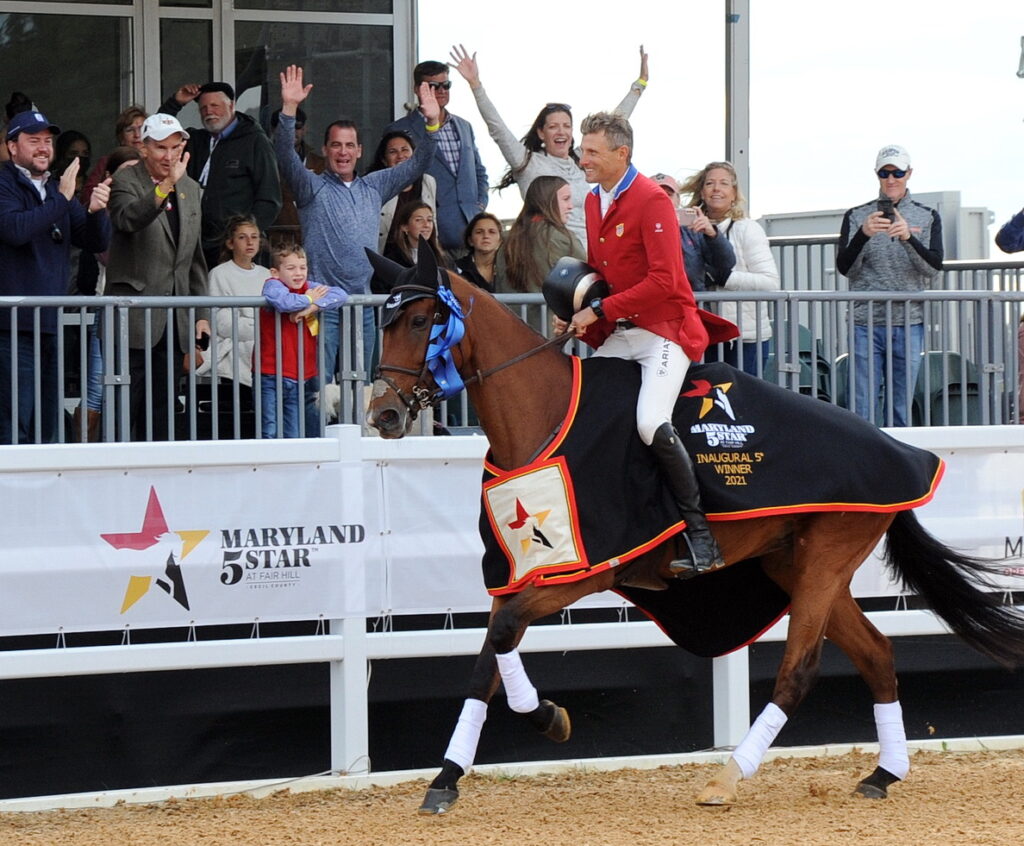
Boyd Martin with On Cue during his victory gallop at the Fair Hill 5-star. (Photo © 2021 by Nancy Jaffer)
Another facet of the new look at eventing was a re-do of the upper-level calendar. It sadly left by the wayside the Jersey Fresh International event, a fixture on which so many had worked so hard for nearly two decades at the Horse Park of New Jersey. Under the reshuffle, Jersey Fresh lost its coveted 4-star-Long designation, which had made it a selection trial for Olympics and World Championships, and also was divested of its 4-star Short and 3-star designations. Although the new calendar isn’t going into effect until 2023, sponsors did not want to back a last hurrah for Jersey Fresh in 2022, since the event would not be continuing. It’s such a shame, and a loss for the region.
Among the unresolved situations from 2021 is that of Somerset County’s Lord Stirling stable in Basking Ridge, N.J. The facility, one of the few in the area where people could learn to ride for a reasonable fee, had that program shut down in the midst of the pandemic and the horses were sold in 2020. A committee has been studying the future of the property, but a year on, there’s been no word about its conclusions, and the stable is now the province of boarders who have their own horses.
As always, we lost key people in the horse world during the 12 months gone by. It seemed to me that there were many more than usual whom I knew this year, though none of that group died of Covid. This is just how things go in the scheme of things, but it is still hard to take.
So let us remember those to whom we said goodbye.
Among them was the irrepressible Mason Phelps, who kept the National Horse Show alive as its president and moving force. A member of the USET in his youth, he translated his equestrian involvement into energy for so many causes. More tears were shed when two more pillars of the equestrian community died within the week after Mason’s passing in May. The dean of ringmasters, John Franzreb, left us with memories of his warmth that had lifted the spirits of so many competitors.
The deaths of both Mason and John were shocking because they were unexpected, but the passing of respected trainer Ray Francis, a horseman’s horseman, hurt just as much, even though he had been ill for a while.
Prince Phillip of Great Britain, a former president of the FEI (International Equestrian Federation) and the man who codified the rules for four-in-hand combined driving, said farewell in April at age 99.
Others we will miss include Harry de Leyer, who rode $80 former plow horse Snowman to show jumping stardom, then earned more fame late in the game with a book and movie based on his life and that of his marvelous horse; Kenneth Wheeler, a hunter trainer known among other things for his enormous success showing horses in-hand; the co-chair of the Far Hills Race Meeting, John von Stade and Bert Firestone, another man known not only in racing circles, but also among show jumpers and fox hunters.
Also Carol Harris, a native of West Orange active in the American Quarter Horse Association and famous for her relationship with the fabulous stallion, Rugged Lark; eventing cross-country course designer and builder Tremaine Cooper; Tom Mannos, well-known in New Jersey and beyond as a horse show announcer, and Frank Gibbs, master of the Spring Valley Hounds. The most recent death of note came this month, when trainer and horse dealer Jessamy Rousson passed.
We lost some great horses, too. Among those who went to greener pastures were Brentina, the special mare who elevated the status of U.S. dressage with rider Debbie McDonald. They earned medals in the Olympics, world championships and Pan American Games, as well as logging the first American World Cup finals win.
Others who are gone include Flexible, Rich Fellers’ 2012 show jumping World Cup winner and member of the U.S. Olympic team that year; the stallion Sandro Hit, who is in the bloodlines of all three U.S. 2020 Olympic team silver medal mounts; Poggio II, the plucky former mountain pack horse who carried Amy Tryon to Olympic and world championship medals, two-time American Invitational winner Kroon Gravin, ridden by Molly Ashe Cawley; eventing star Ballynoe Castle RM, the ride of Buck Davidson, and Judgement, guided to grand prix distinction by show jumpers Michal Matz and Beezie Madden.
When you uncork the champagne on New Year’s Eve, think of them and offer a toast in the memory of all they achieved as we ride forward in the unknown of 2022.

